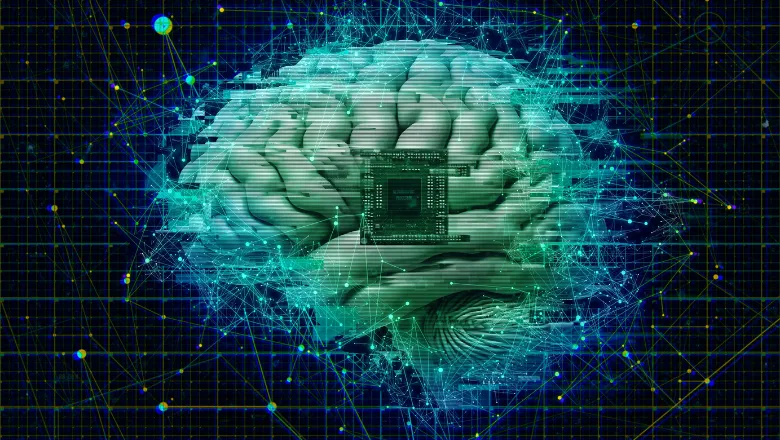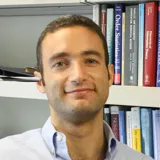By drawing inspiration from these biological mechanisms, we can usher in a whole new age of fast, compact and efficient computing to meet the needs of a connected world. It’s my hope the new IKC will help meet those needs.”
Professor Bipin Rajendran
16 September 2025
King's joins UK's first brain-inspired computing innovation centre
King’s has joined the UK’s first Innovation and Knowledge Centre (IKC) dedicated to neuromorphic computing hardware, established following a £12.8 million funding grant from the Engineering and Physical Sciences Research Council (EPSRC).

Along with King’s academics from NMES and IoPPN, Professor Bipin Rajendran from the Department of Engineering will lead the King’s team which is part of the UCL-led Neuroware centre. The centre seeks to accelerate the development of next-generation brain-inspired computing technologies and their deployment onto computer chips. This will help underpin new advancements in edge AI, healthcare and security, including through ultra-low-power smart sensors and ultrafast photonic neural network systems.
Bringing together King’s, UCL, Imperial, the National Physical Laboratory (NPL) and the universities of Cambridge, Oxford, Manchester, Strathclyde, and Sheffield, Neuroware will also help consolidate the UK’s leadership in brain-inspired semiconductor technologies and accelerate their commercialisation over the five-year lifecycle of the programme.
This will include stepping up research on current silicon-based processors, emerging materials for next-generation chips and photonic neuromorphic platforms, as well as working with industrial partners to support spinouts and commercialisation.
As AI models of increasing size are being integrated into daily life, current computing methods are failing to process zettabytes of data in efficient ways, with potentially disastrous impacts for energy consumption and its environmental costs.
Professor Rajendran said, “Nature is far more efficient than anything man-made when it comes to conserving energy. For instance, the neurons in our brain communicate by sending ‘spikes’ which then strengthen or weaken the connections between them, helping us to learn and form memories quickly and efficiently.
“By drawing inspiration from these biological mechanisms, we can usher in a whole new age of fast, compact and efficient computing to meet the needs of a connected world. It’s my hope the new IKC will help meet those needs.”
Commenting on the place of Neurowave in the wider landscape of the UK UCL’s Professor Tony Kenyon, Director of the IKC, said “Neuromorphic computing is a once-in-a-generation opportunity for the UK to lead in a transformative technology. We already have the research excellence and a vibrant start-up ecosystem. The Neuroware centre will provide the structure, scale and support to turn that potential into real-world impact. I am delighted to be working with such an inspiring set of academic and industrial partners.”
EPSRC is proud to support this new Innovation and Knowledge Centre, which will place the UK at the forefront of brain-inspired computing hardware. The research on neuromorphic computing systems could transform how we process and interact with information in the future, potentially affording computers that are more energy efficient, feature enhanced parallel processing capability and generally more adaptable.”
Professor Charlotte Deane MBE, Executive Chair of EPSRC
The centre will work in a decentralised manner, with King’s, UCL, Imperial, Cambridge and the NPL working on unconventional computing styles and electronic systems that go beyond currently used circuits and architectures.
Professor Rajendran will also lead the workstream on Circuits and Systems that will underpin the IKC’s technical programme. The King’s team includes Professor Anatoly Zayats, Professor Sir Bashir Al-Hashimi, Dr Kai Xu, Professor Mohammad Shikh-Bahaei, Professor Osvaldo Simeone and Professor Sandrine Thuret, who will contribute to the other workstreams of the IKC.
The centre will also play a strategic role in shaping national policy and skills development, working with the UK Electronics Skills Foundation, the Ditchley Foundation and UCL’s Policy Impact Unit.
Professor Charlotte Deane MBE, Executive Chair of EPSRC, said: “EPSRC is proud to support this new Innovation and Knowledge Centre, which will place the UK at the forefront of brain-inspired computing hardware. The research on neuromorphic computing systems could transform how we process and interact with information in the future, potentially affording computers that are more energy efficient, feature enhanced parallel processing capability and generally more adaptable.”







